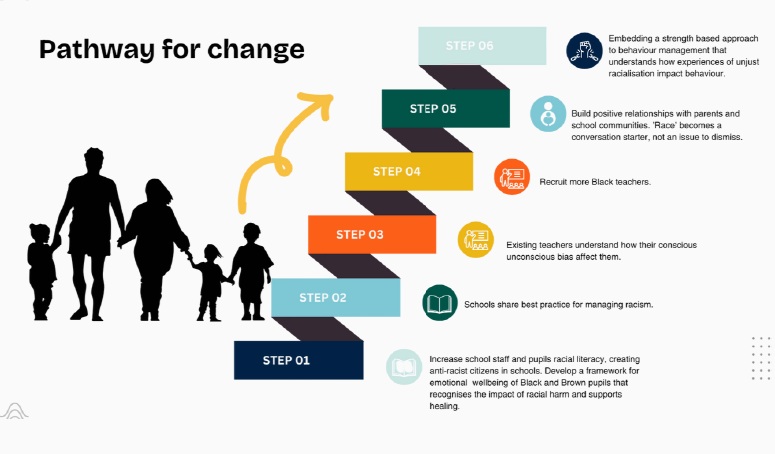BSWN report launch: now is the time for action!
March 2025
The Black South West Network (BSWN), a Black-led racial justice organisation based in Bristol, recently held a Policy Roundtable on Education and Race in Bristol’s City Hall. They brought together school leaders, parents, education policy actors, and racial justice organisers to discuss how we – as a city – must collectively tackle long-standing racial injustices in our schooling system. These injustices have gone on for too long – and participants all agreed that now is the time for action.
Dr Barbara Brown, Research and Advocacy Lead at BSWN, opened the meeting to share how educational justice is a core pillar of BSWN’s Access to Justice work. This was followed by a presentation by Japheth Monzon, Project Officer at BSWN, who shared key findings from BSWN’s research into educational inequalities nationally, regionally and in Bristol – demonstrating the extent to which Black pupils in particular are being let down by our education system across indicators such as inclusion/belonging, academic attainment, and post-school pathways.
The picture of educational inequalities in Bristol’s schools was then deepened by Hannah Woodhouse, Executive Director of Children’s Services at the Bristol City Council, whose presentation highlighted that educational attainment at Key Stage 2 (primary schooling) across Bristol was in the bottom ten percent nationally. Attainment in Key Stage 2 is starkly lower for all non-white ethnic groups in the city, compared to the national picture, according to 2023/24 data (see Figure 1).

The meeting then heard from Dr Annabel Wilson, Research Fellow at Repair-Ed, who worked in partnership with BSWN to conduct voice-centred workshops with parents of Black children across three areas of Bristol. You can read the report here: Reimagining Education in Bristol with Parents of Black Children, which includes powerful testimonies from parents, whose experience offers pathways to change and pathways to justice (see Figure 2). You can also listen to some of these testimonies on the People’s History of Schooling in Bristol.

Participants at the roundtable were privileged to hear directly from some parents themselves. Parents shared their stories of the intergenerational harms caused by racial injustice in Bristol’s schools. As a group, we reflected on why it’s no surprise that the teaching profession fails to recruit and retain Black teachers when education as an institution has failed to demonstrate that it is a place for Black people – both children and adults – to thrive, be valued, and be supported.
Margaret Simmons-Bird shared her experience and research advocating for educational equity in Bristol and across the South West and then the presentations closed with a powerful reminder from Lana Crosbie from the Bristol chapter of No More Exclusion about the importance of addressing the conditions which enable racism to perpetuate in schools. Reflecting specifically on No More Exclusion’s work to abolish exclusions in schools, Lana says it shouldn’t be a radical demand to get rid of the things that are harmful for our children.
The meeting offered us the space to identify and discuss what the ambitions of the city should be. There was a strong feeling among participants that anti-racist transformation can occur where there is a will and that addressing systemic and structural racism in education is our collective responsibility. The consensus in the room was that there had been ample consultations and discussions, and that now is the time for action.

